Across the street from the Cottonwood neighborhood, just past Smith’s and Jackson Hole High School, is a field that looks pretty unassuming. On a recent Monday, an old, broken-down Jeep laid half-buried in the snow and cows grazed in the distance. It’s hard to think that this patch of land south of Jackson became the source of so much tension in Teton County for more than a year, culminating in a controversial decision by the Board of County Commissioners earlier this month.
Mark Newcomb was one of four Teton County Commissioners who voted to approve a sketch plan to develop up to 83 market-rate homes in the now-unremarkable field, and he said he was unsure of how he was going to vote up until the last minute.
“It was the hardest…by far the hardest vote that I ever took,” he said.
The land in question, located just outside the Town of Jackson limits, has been owned for decades by the Gills, a prominent local family that has maintained a ranch in Jackson Hole since 1928. Newcomb said he made his decision based on the county laws he’s sworn to uphold but that a lot of his constituents were frustrated by his vote.
“They see it as adding 83 new, completely free-market, relatively large homes to the community,” he said. “And they’re asking, ‘Couldn’t we have done better?’”
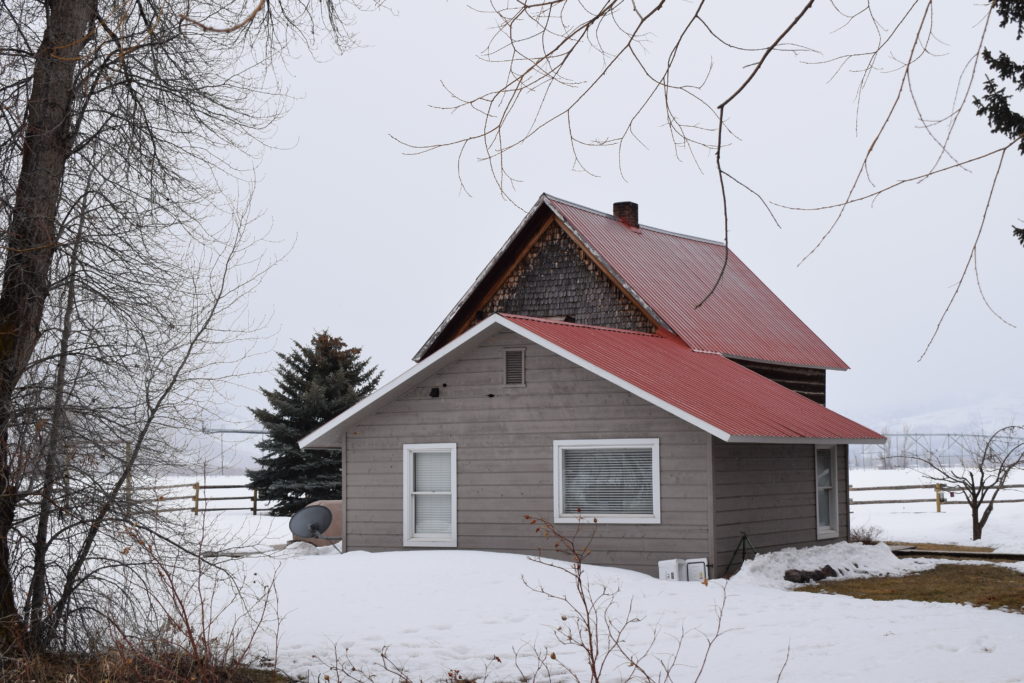
The lone built property currently located on the plot in question is worth approximately $1.2 million, according to Zillow. (Will Walkey/KHOL)
Just one lone house currently stands on the 26 acres slated for development. It’s a relatively modest, single-family home with a small deck, shed and a backyard about the size of a basketball court. The real estate website Zillow estimates that the property is worth more than $1.2 million dollars.
Beyond affecting the local real estate market, the Gill’s development will also influence public infrastructure, like roadways and sewer systems.
“There’s a real valid concern that the town needs to very carefully manage the connections to its wastewater treatment plant,” Newcomb said.
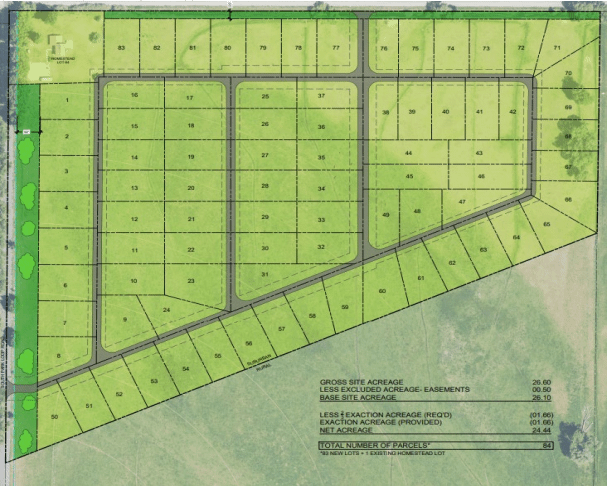
The sketch plan to develop 26 acres in Northern South Park was approved by the Teton County Board of Commissioners on March 2. (Courtesy of the Official Sketch Plan 2020-0001)
The development will need to connect to the town’s water system once completed, and that’s where a lot of the debate around the vote lies. The Gill property is also zoned such that it doesn’t need to provide affordable housing by law. But the local wastewater system only has so much capacity—and the town has its own agenda, according to Newcomb and recent testimony from the Jackson Town Council.
“And they’re [town officials are] going to ask themselves, ‘What’s the best use of the remaining capacity in our town sewer plant?’ And they will hopefully, most likely say, ‘We think the best use is for as much workforce housing to be hooked up to this as possible,’” Newcomb said.
That’s why the town has been noncommittal about whether or not they’ll allow the Gill development to connect to its sewer system, and that hesitance almost pushed Newcomb and others to vote against the sketch plan entirely. In fact, the Gill’s entire proposal is still contingent on the town agreeing to connect the future neighborhood to its sewer system. But, over the past month, that agreement, or rather, concession, seems increasingly likely.
Senate File 157, sponsored by Sen. Bo Biteman (R-Ranchester), would prohibit cities and towns from conditioning public utility connections on the inclusion of income-restricted housing or anything else that may lower a property’s profit. The state-level bill would essentially force Jackson to allow the Gills to connect, and the legislation appears almost specifically designed for this local context. The majority of the public comments about the bill explicitly addressed the Gill proposal, and family member Nikki Gill also traveled to Cheyenne to testify in-person to the Senate Agriculture, State and Public Lands & Water Resources Committee.
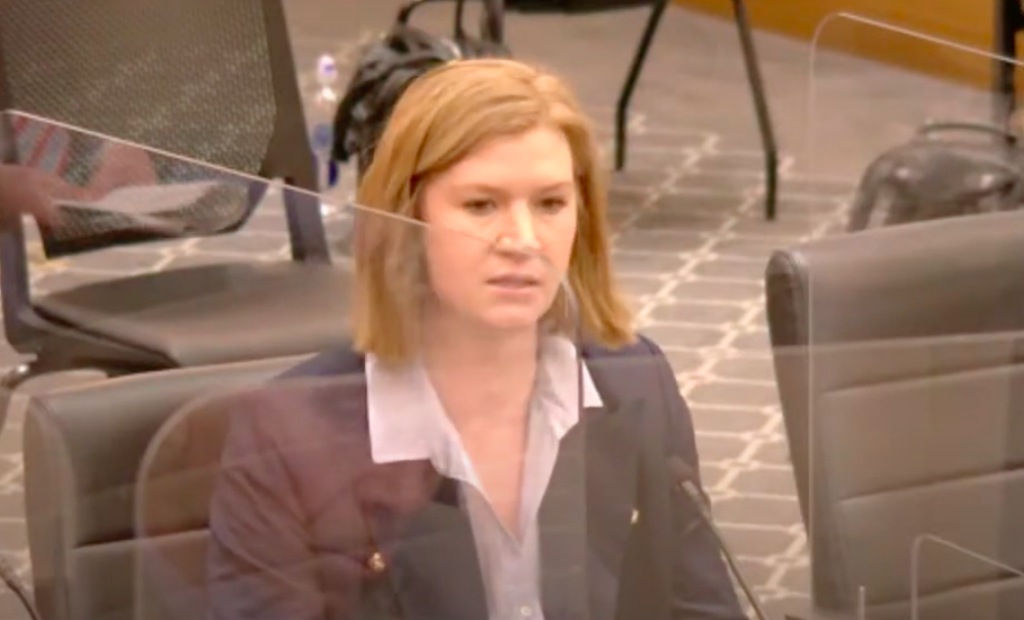
Nikki Gill testified in support of Senate File 157 in front of the Senate Agriculture, State and Public Lands & Water Resources Committee on March 4. (Screenshot Courtesy of the Wyoming Legislature)
“I’m a proud fifth-generation rancher’s daughter,” Gill said. “I come from a Wyoming family with more than 100 years of property ownership in this great state. For estate reasons, my family needs to develop a portion of our beloved ranch.”
Gill called the Town of Jackson’s reluctance to connect the development to the public sewer “discriminatory,” and she implored the senate committee, which is made up of five Republicans, to rule in her favor.
“They want to control private property, force no growth and force us to develop devalued homes in order to get the connection. I have no other choice but to come to you for help,” she said. “If it can happen to my family, it can happen to other property owners and ranchers in Wyoming.”
Some who testified against the bill said it would be an overreach by the state, with one local advocate describing the situation as if the Gills didn’t like what they heard from mom, so they went to dad. Vice Mayor of Jackson Arne Jorgenson also publicly commented via Zoom against the measure.
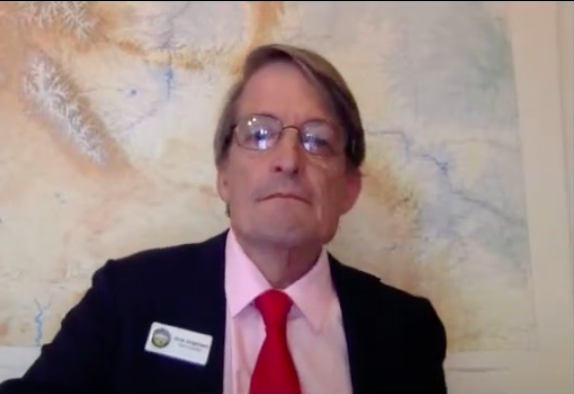
Jackson’s Vice Mayor Arne Jorgenson testified against Senate File 157 virtually on March 4. (Screenshot Courtesy of the Wyoming Legislature)
“I am disappointed to be here today speaking against a bill that seems to be directly focused on an issue that the Jackson Town Council and the Teton County Board of Commissioners are dealing with locally,” he said. “Please do not vote in support of limiting zoning or prohibiting cities and towns from having a say over our public assets and infrastructure.”
Despite Jorgenson’s plea and a signed letter opposing the bill from four members of the Jackson Town Council, the Senate committee voted unanimously in favor of the bill, which was followed by three successful votes on the Senate floor. As of early April, the legislation has now also passed the state House of Representatives, and unless Governor Mark Gordon vetoes it, the Town of Jackson is out of luck.*
Newcomb said it’s unfortunate that the debate over the Gill development got to this point.
“The sense, again, of feeling as if the will of the community and the concerns of the community were being end-run by special interests was really frustrating,” he said.
Newcomb said the proposed state bill didn’t flip his decision one way or the other, but it was put on his desk essentially the day before the Gills forced the Commission to vote on the sketch plan. Maneuvering at the state level undoubtedly hung over the heads of local officials, and it will continue to do so as the development process moves forward.
Additionally, Newcomb said many state lawmakers aren’t thinking about how this bill could impact other Wyoming towns in the near future.
“I don’t know if anyone is thinking about the statewide ramifications and the lack of control it might give other entities that own and operate a wastewater treatment plant,” he said. “That could occur in other parts of Wyoming that have seen an energy boom—whether it’s a wind energy boom or a natural gas energy boom—and are faced with a large influx of new workers and have to make thoughtful decisions about their infrastructure and public facilities.”
Still, Newcomb said he understands why a landowner like the Gill family would want to maximize profits from developing their property and why they would consider taking a fight to do it to the state level. He also said not all is lost on the affordable housing front. There’s still an ongoing public planning process to develop 225 acres of Gill land next to the smaller 26-acre plot that just got approved.
“It’s an amazing opportunity and it’s kind of a once in a lifetime thing,” he said. “So, folks should do it and should get involved.”
The Northern South Park neighborhood planning effort is where hundreds of homes for the local workforce could still potentially get built with enough public pressure—a goal that’s desperately needed in Teton County.
*EDITOR’S NOTE 4/13/21 @ 9:40 a.m.: This story was updated to reflect the current status of Senate File 157.
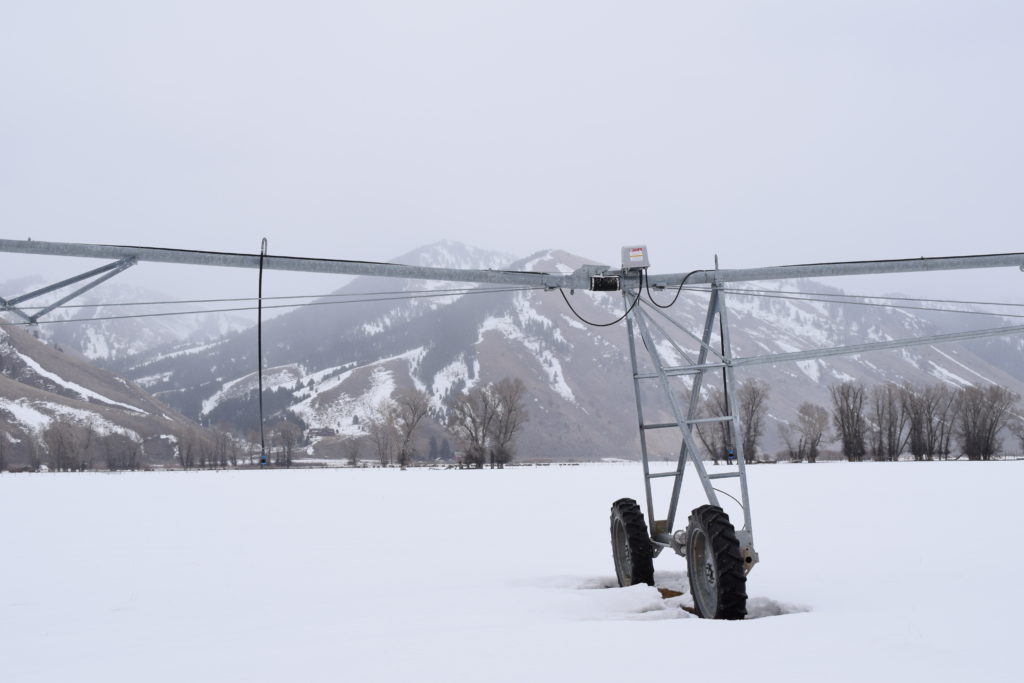
A corner of the Gill Family ranch, which is slated for development in the coming years. (Will Walkey/KHOL)






